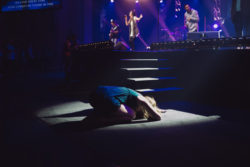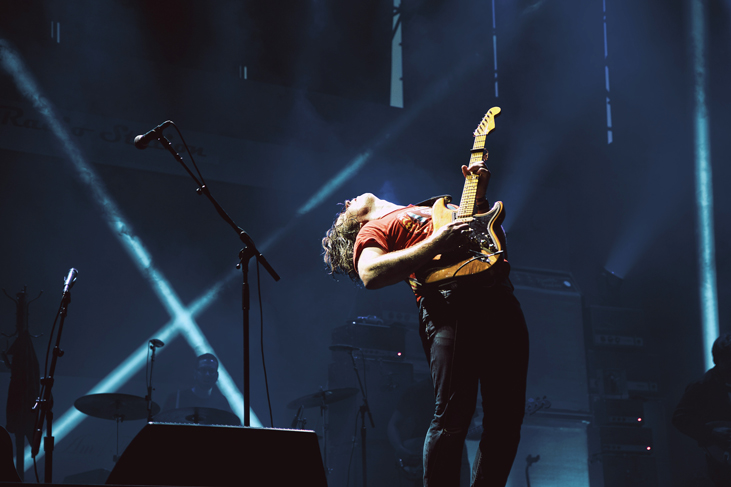5 Ways to Get Shy Music Students on Stage

For every student musician who craves the electricity of the stage, there are several who treat the microphone like a cattle prod. Considering how many times I've had my lips zapped by a poorly grounded mic, maybe they're the wise ones.
But seriously, most students would be better off if they got past their fear and performed onstage. As a professional musician, you know the stage teaches different skills than the studio. Speaking skills, teamwork, stage presence, staying in sync with unpredictable musicians, tuning in the middle of your song--you don’t learn these things practicing in your bedroom.
That's a shame. Many of these skills aren't just musical. They're life skills that help you deal with your in-laws, nail a job interview, even think clearly in an emergency.
So how do we get these shy students on stage?
1. Ease in
How do you tackle a long, challenging song? You start with a small section. And to get a shy student to perform in a high-pressure situation, do the same: Shrink the challenge by giving them lower-pressure performance opportunities that serve as stepping stones up to the stage. Download my list of 6 low-pressure performance opportunities here.
Also, their first song doesn’t need to be a tour de force. With all the other challenges of performing live, difficult material will just overwhelm them.
2. Teach focus

Do you remember what it was like performing a challenging song on a big stage for the first time? For many, it’s like being in a dream, which perhaps is why my first-time performers often have no memory of what happened on stage. The avalanche of bright light, strange sound (especially if you’re using amplification), unfamiliar equipment, and sensation of being watched by a crowd, creates an incredibly distracting environment.
Our students don’t know how rehearsed their music needs to be in order to perform well in these circumstances. Consider the shock they routinely display when the piece they had played so well at home falls apart under your gaze. The lesson they need to learn: If it takes 20 hours of practice to play a song well in ideal conditions, it might take twice that time to prepare it for the distractions of the stage.
To teach this lesson, I do something I like to call The Blarney Test. I tell them that I’m going to try to distract them while they perform their song, and their job is to try to ignore me and play as best they can. Once they begin playing, I tell them a short, dramatic story. Once the song’s over, it’s fun to ask students how much of the story they heard.
3. Perform in a Group
In an ensemble, the gaze of the audience is diffused over the whole group, and mistakes made by your shy performer can be masked, or at least moderated, by the rest of the band. Just make sure you’ve trained your student to the required listening skills by using a metronome, backing tracks, accompanying them yourself, or holding full-band rehearsals.
4. Teach Stage Skills

Photo by Jorge Gordo on Unsplash
Any tool you can give your student to feel more familiar with the stage and connect with the audience will boost their confidence. Teach them stage presence, correct mic technique (if they’re singing or speaking), and familiarity with stage equipment like monitors.
One simple skill I teach all my performers, regardless of their instrument or role in a band, is to flash the audience an enthusiastic, warm smile as soon as they take the stage. It’s too much to ask most beginning performers to pay attention to the audience while they perform, but connecting with them before the music begins is doable. And, if it’s a good audience, their warm response immediately floods the student with support.
BLOG POST DOWNLOAD:
6 Low-Pressure Performance Opportunities
5. Teach calming techniques
Teach your student ways to soothe their nerves as they’re waiting to go on stage. A strange but effective pro technique is to yawn for a half-hour. Big, eye-watering yawns, one after the other, for a long time, will eventually trick the body into stopping its release of adrenaline. Since yawning in public is somewhat taboo, I recommend students do this in the car on the way to the show.
Why does this work? Our body’s response to fear is stuck in the Pleistocene, better suited to fleeing a predator than playing a Bach etude. By yawning, we override this fight-and-flight response, convincing our sweating, shaking body that the saber-toothed cat is gone, and it’s time to chill in your cave, cuddle with your hairy neighbor, and gnaw on a mastodon drumlet.
Mmmm. Come to think of it, that pretty much describes what I do every night when I get sleepy. There must be something to this science stuff.
If you haven't downloaded this blog's free download, my list of 6 low-pressure performance opportunities, get it now! Your students will thank you!
How do you get your shy performers on stage? Leave a comment below!
